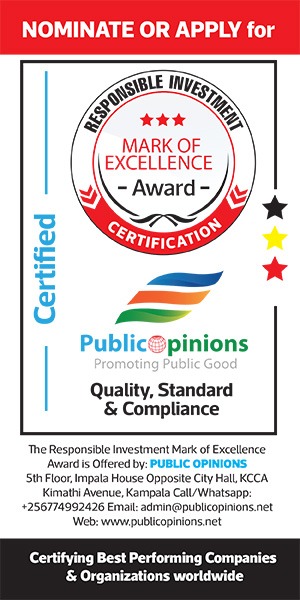
The United Nations Development Programme (UNDP) is a Winner of the 2016 Global Sustainable Development Award and Accredited as a Global 500 Sustainable Development Agencies of the year 2016 in appreciation of its contribution towards social-economic development of the world and its contribution towards attainment of United Nations Sustainable Development Goals. Recognised for its commitment to attain Sustainable Peace and development through eradication of poverty, and the reduction of inequalities and exclusion in 170 countries. Awarded and Accredited by Public Opinions International (Uganda-East Africa) AND Organisation for International Friends of Africa (OIFA). 
 Public Opinions International is a Partner and Member of International Organisation for Educational Development (IOED) andInternational Police Commission which is is duly registered as an international Non-Profit, Non-Secretarial, Peacekeeping and Social Development Paramilitary Organization based in the State of California, United States of America with extension commands in member nations of the U.N.The International Police Commission has also been given the Consultative Status from the UN ECOSOC and it is also a Member of the United Nations Office of the Drugs and Crimes “UNODC.
Public Opinions International is a Partner and Member of International Organisation for Educational Development (IOED) andInternational Police Commission which is is duly registered as an international Non-Profit, Non-Secretarial, Peacekeeping and Social Development Paramilitary Organization based in the State of California, United States of America with extension commands in member nations of the U.N.The International Police Commission has also been given the Consultative Status from the UN ECOSOC and it is also a Member of the United Nations Office of the Drugs and Crimes “UNODC.
The United Nations Development Programme (UNDP) is the United Nations‘ global development network.
Headquartered in New York City, UNDP advocates for change and connects countries to knowledge, experience and resources to help people build a better life. It provides expert advice, training, and grants support to developing countries, with increasing emphasis on assistance to the least developed countries.
The status of UNDP is that of an executive board within the United Nations General Assembly. The UNDP Administrator is the third highest-ranking official of the United Nations after the United Nations Secretary-General and Deputy Secretary-General.[2]
UNDP works in nearly 170 countries and territories, helping to achieve the eradication of poverty, and the reduction of inequalities and exclusion. We help countries to develop policies, leadership skills, partnering abilities, institutional capabilities and build resilience in order to sustain development results.
This is a critical time for the world. At UNDP, we see this period as a huge opportunity to advance the global sustainable development agenda. Last year, world leaders adopted the 2030 Agenda for Sustainable Development to continue the work of the Millennium Development Goals. UNDP is working to strengthen new frameworks for development, disaster risk reduction and climate change. We support countries’ efforts to achieve the new Sustainable Development Goals, or Global Goals, which will guide global development priorities for the next 15 years.
UNDP focuses on helping countries build and share solutions in three main areas:
In all our activities, we encourage the protection of human rights and the empowerment of women, minorities and the poorest and most vulnerable.
The annual Human Development Report, commissioned by UNDP, focuses the global debate on key development issues, providing new measurement tools, innovative analysis and often controversial policy proposals. The global Report’s analytical framework and inclusive approach carry over into regional, national and local Human Development Reports, also supported by UNDP.
UNDP role in UN coordination
UN coordination is a key priority for UNDP and a commitment in our Strategic Plan. The UNDP Administrator is the Chair of the UN Development Group (UNDG), which unites the funds, programmes, specialized agencies, departments and offices of the UN system that play a role in development. Created by former UN Secretary-General Kofi Annan and endorsed by the General Assembly, the UNDG seeks to ‘facilitate joint policy formulation, encourage programmatic collaboration and realize management efficiencies’ among UN agencies.
At the country level, this interagency structure is embedded in the Resident Coordinator System (RCS), which encompasses all organizations of the United Nations system with operational activities for development. The RCS is managed by UNDP on behalf of the entire system. The Resident Coordinator function is carried by the UNDP Resident Representative. As the designated representative of the Secretary-General, the Resident Coordinator is the leader of the UN Country Team (UNCT) and plays a central role in coordinating the UN’s development operations and ensuring alignment with national priorities. UNDP provides the lion’s share of the resources needed to maintain the RC system in over 130 countries. The remainder of the RCS funding comes from a cost-sharing arrangement between all participating agencies.
For more information about the UNDG and the Resident Coordinator System, please click here.
UNDP also administers the UN Capital Development Fund, which helps developing countries grow their economies by supplementing existing sources of capital assistance by means of grants and loans; and UN Volunteers, which fields over 6,000 volunteers from 160 countries in support of peace and development through volunteerism worldwide.
Fit-for-purpose to deliver on Agenda 2030
As countries start implementing the 2030 Agenda, UNDP is ready for action.
UNDP’s strength comes from having the trust of developing countries, owing to our impartial character, longstanding presence and commitment to the poorest and most vulnerable. We also play a key role as the backbone of the wider UN Development System, helping agencies work together for sustainable development.
Our Strategic Plan and Structural Change have made us more focused, efficient, and country-oriented. The new structure integrates crisis and gender for the first time in all areas of policy and programmes. UNDP’s Strategic Plan 2014-17 — centred on seven sets of outcomes, compared to the previous 35 — presents a unifying vision to best help countries eradicate poverty and reduce inequalities and exclusion.
Our new Integrated Results and Resources Framework clearly shows the allocation of resources and results achieved, allowing stakeholders to easily monitor performance, learn lessons, and hold the organization accountable for the funds entrusted to it. Executive Board members were pleased with the new reporting format based on the Framework, and welcomed the 2015 Annual Report as a step towards greater results-based management.
UNDP has improved standards for program planning and quality assurance, and a robust process for program appraisal. Country Program Documents show better targeting of resources. Data is used more rigorously to inform programming. New quality standards for projects are being rolled out in 2016.
UNDP is today a leaner and more efficient organization, operating even closer to the field. UNDP’s new structure reflects a staff reduction of 12% at headquarters and regional levels. We have also moved a further 20% of staff from New York to regional hubs to strengthen our support to country offices.
For two consecutive years, the Aid Transparency Index has recognized UNDP as the most transparent development agency in the world, while AidData (2015) names UNDP among the development partners that communicate most frequently with host government counterparts. We have put in place an open data platform that enables wide global usage of data. More details of UNDP’s activities, budgets and results are being published than ever before on open.undp.org, covering 4,743 projects in 155 countries and territories.
As of 1 January 2015, UNDP adopted mandatory Social and Environmental Standards for all of its projects and programmes. These standards will strengthen UNDP’s efforts for increased quality in its programmes and ensure social and environmental benefits for the people we serve.
UNDP is guided by the United Nations Development Group’s common approach implementing the SDGs, called MAPS, or Mainstreaming, Acceleration, and Policy Support.
Adequate levels of Core Resources and lightly earmarked funds are essential for UNDP to carry out its mandate and to coordinate UN system support to help countries “land” the SDGs. With about $5 billion in voluntary contributions annually, UNDP remains a partner of choice and passes the “market test” in an environment in which partners can choose from many organizations to work with.
All sources of finance — domestic and international, public and private — are needed to achieve the SDGs. UNDP is redoubling efforts to develop partnerships with International Financial Institutions, civil society, the private sector, as well as individuals. The aim is to have UNDP support governments in securing increasingly diverse sources of innovative financing for development and ensure that such financing is risk-informed.
SOME OF OUR RESULTS
Sustainable development. UNDP projects led to:
- 18.6 million people (50 percent women) benefiting from improved livelihoods in 115 countries
- 1.35 million new jobs (42 percent for women) being created in 94 countries
- 63 countries adopting policies and systems to boost employment and livelihoods creation
- Technology support in 53 countries to phase out gases that destroy the ozone layer
- 22 countries or entities implementing or completing MDG acceleration framework action plans
- 76 countries implementing measures towards low-emission and climate-resilient development objectives
Inclusive and effective democratic governance. UNDP projects led to:
- Over 68 million new voters registered in 37 countries
- 2.1 million people in 33 countries gaining access to legal aid services,
- 1.7 million people receiving antiretroviral treatment in 33 countries (51 percent women)
- 24 million people receiving HIV-related behavioural change communication in 25 countries
- 9.7 million people (48 percent women) expressing their vision for the future through the UNDP-hosted ‘My World’ global survey, the largest crowd-sourcing exercise in United Nations history
Resilience building. UNDP projects led to:
- 1,035 new disaster reduction and adaptation plans being put in place in 51 countries
- 35 countries with enforceable laws or regulations to address disaster and climate risks
- 2.5 million people achieving better access to energy in 46 countries
- 189 new early warning systems in 26 countries
- 407 new disaster response and recovery plans in 28 countries
Public Opinions International
Organisation for International Friends of Africa (OIFA)
Plot 30 Suite 5, Level 4 Green Land Tower
Opposite Bank of Uganda Kampala Road
P.o Box 35297 Kampala-Uganda
Tel: 256 701 992 426
Email:[email protected]
Web: www.pubopinions.org


















